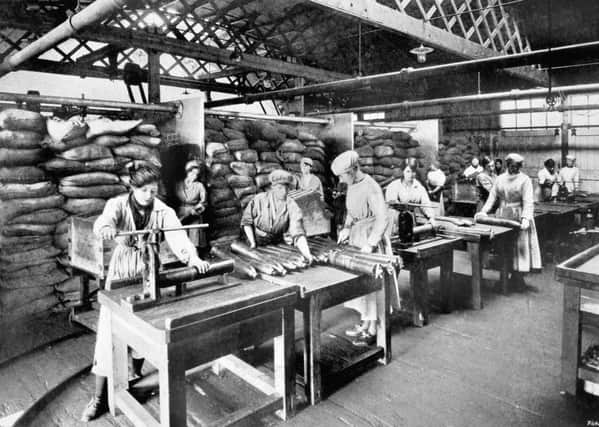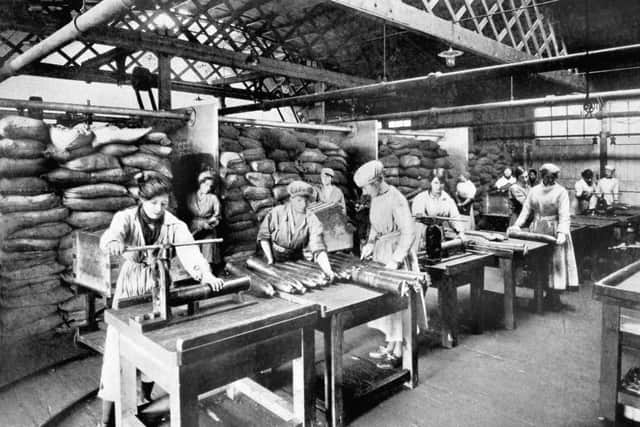Leeds' saddest site: 35 women killed in factory blast they hushed up


A total of 35 women died in an explosion at the Barnbow munitions factory in Cross Gates in December 1916 – but the single largest loss of life in the city’s history was hushed up and kept out of the headlines for fear of damaging national morale.
Most of the buildings at Barnbow were demolished by the mid-1920s but the remains of the factory – which show its near-complete layout – have survived to this day.
Advertisement
Hide AdAdvertisement
Hide AdAnd now it has been announced that the remains have been added to the national heritage list by the Department for Culture, Media and Sport (DCMS) as a tribute to the victims of the 1916 explosion and those who worked alongside them – the affectionately-named Barnbow lasses.


The status means the remains will be protected during development work in an area that has been earmarked for housing and the new East Leeds Orbital Road.
Heritage Minister Tracey Crouch said: “As we mark the centenary of the First World War, it’s so important that we remember the sacrifices of those who supported on the home front – especially women.
“The Barnbow lasses played such a vital role in the war effort and by scheduling this factory (for protection), we continue to pay tribute to their contributions and sacrifices 100 years on.”
Advertisement
Hide AdAdvertisement
Hide AdThe DCMS decision, made on the advice of Historic England, was welcomed by Leeds City Council leader Coun Judith Blake.


Coun Blake said: “The role of Barnbow in the history of Leeds is huge, and the women and men at the former munitions works showed huge determination, fortitude and sacrifice which kept the city and the country going during the First World War.
“By giving the site heritage protection the story behind the Barnbow lasses can continue, helping preserve their legacy and ensuring future generations understand the impact they had on lives today.”
Praise for the move also came from East Leeds History and Archaeology Society, which has spent years trying to raise awareness of the story of Barnbow.
Advertisement
Hide AdAdvertisement
Hide AdHistoric England chief executive Duncan Wilson said: “The First World War brought many tragedies. This one has not yet been fully recognised and commemorated. The death of the Barnbow lasses not only resonates today for the tragic loss of life but also represents the significant role played by women in winning the war.
“This led to a major national change in the perception of women at work. Barnbow is particularly poignant as the site of the worst disaster for loss of life in Leeds’s history and it is thanks to the local community that the memory of these remarkable women and their extraordinary courage has been kept alive.”
The factory opened in 1915 and, as increasing numbers of men were called up to fight in the war, women eventually comprised the vast majority of its workforce.
The 1916 tragedy was one of three fatal explosions at Barnbow during the conflict. Two girls were killed in a blast in March 1917 while another claimed the lives of three men a year later.
Advertisement
Hide AdAdvertisement
Hide AdAt its height, the factory employed more than 17,000 people and was reportedly the biggest of its kind in Europe.
A large proportion of the high-explosive shells that were used during the Battle of the Somme were filled at the site.
A memorial to the Barnbow lasses was unveiled at Manston Park in Cross Gates in 2012.
It is made up of a memorial stone and a plaque that lists the names of the workers who died at Barnbow.
Advertisement
Hide AdAdvertisement
Hide AdInformation boards also give details about the site, which was officially known as National Filling Factory No. 1.
Work on the memorial was carried out by Leeds City Council and East Leeds History and Archaeology Society.
The sacrifices made by the men and women who toiled at the factory have also been remembered by Barnbow Canaries, a play that was inspired by the explosion of 1916.
Written by Alice Nutter, formerly of Leeds-based indie rock band Chumbawamba, it was staged to widespread acclaim at West Yorkshire Playhouse in the city earlier this year.